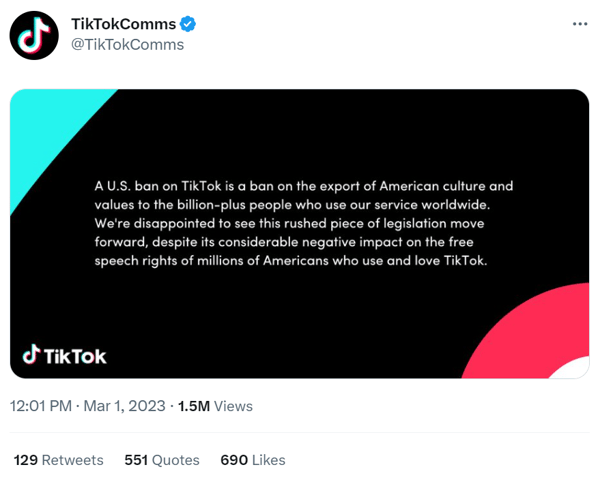TikTok Amazon Ads Integration: What Brands Need to Know
Amazon checkout on TikTok has been announced! Here's what we know about the new TikTok Amazon ads integration and how it impacts brands and creators.
What does the recent TikTok ban mean for brands? Below we explain the context of the 2025 ban and whether brands on the platform should do about it.


TLDR: Headlines tout a possible TikTok ban but a total ban isn't guaranteed just yet.
TikTok still faces a deadline to divest itself or face a ban in January 19, 2025. A sell-off of TikTok from its parent company (Bytedance) would ultimately prevent the ban. The US Supreme Court is set to hear arguments from TikTok on January 10th.
“Is TikTok going to get banned? What does this mean for my brand?”
With 170+ million US consumers and creators on TikTok, and brands now using it as a major part of their customer acquisition strategy, many are keeping a close eye on this conversation.
Last year, the app drove more than $10 billion in consumer spending on its own. That’s not even counting the influencer marketing investments on TikTok. These are projected to increase in 2025 thanks to the great results that brands are seeing on the platform.
But if you’re worried about TikTok being banned, don’t freak out just yet!
The notion that everyday TikTok users will face a widespread ban soon doesn't tell the whole story.
Below we break down the facts behind the ban. We urge brands to watch this story without going into panic mode.
Skip to Section 👇A Brief TikTok Ban Timeline from 2020 to 2025 Latest TikTok Ban Updates and Status (as of January 8, 2025) Why the Phrase "TikTok Ban" is Misleading |
Does this story feel like deja vu in 2025?
That’s because we all discussed the potential of a TikTok ban back in 2020.
And again in 2023!
If you’re out of the loop as to why this is all happening, we’ll catch you up to speed.
Important background info: TikTok is owned by a Chinese Internet company, ByteDance.
July 2020: Rumors swirl that the United States may ban TikTok due to Washington's concerns that the Chinese government could have control over an app that so many Americans use. Meanwhile, TikTok positions itself to be sold back to an American company. They instate an American CEO (former chairman of Disney), ensuring that its data centers are not in China and separated TikTok’s American operations from its parent company. This wasn't difficult since TikTok was originally an American company named Musical.ly, purchased by ByteDance in 2017.
August 2020: President Trump signs an executive order banning TikTok if the app is not sold to an American company within 45 days. Oracle and other investors seek a bid to purchase TikTok’s US operations.
September 2020: TikTok files an injunction to prevent the app’s impending ban. The ban stalls as a result.
December 2020: A federal judge blocks the Trump administration’s TikTok ban. Lawmakers call the proposed ban “arbitrary." The ruling also cites a lack of a “reasonable alternative before banning TikTok.”
June 2021: Under the Biden administration, Trump’s TikTok ban attempts are officially dropped. The new administration calls for reviews of apps like TikTok for security threats. Their goal is to take an “evidence-based” approach.
June 2022: TikTok officially transfers its traffic to US-based Oracle servers. Prior to this, user data was stored in TikTok’s US-based data centers in Virginia with backups in Singapore. Despite rumors, TikTok claims that the Chinese government never accessed US data.
December 8, 2022: TikTok touts new security plans under the oversight of national security agencies. The platform announces a Trust and Safety Team in the US to protect user data and privacy.
December 22, 2022: Forbes releases a report stating “An internal investigation by ByteDance, the parent company of video-sharing platform TikTok, found that employees tracked multiple journalists covering the company, improperly gaining access to their IP addresses and user data in an attempt to identify whether they had been in the same locales as ByteDance employees.” Lawmakers propose bipartisan legislation supporting a ban on federal devices.
December 27, 2022: TikTok is banned from the mobile devices of lawmakers and staff in the US House of Representatives.
December 30, 2022: A revised ban is issued which restricts TikTok from the mobile devices of all federal government employees. Some exceptions are made for research and law enforcement purposes.
March 1, 2023: The US House Foreign Affairs Committee votes to give President Biden approval to ban TikTok. Reporting by Reuters notes that this would be "the most far-reaching US restriction on any social media app" if a ban were to happen. TikTok releases an official statement calling the legislation "rushed." The statement also describes the proposed ban as having a "considerable negative impact on the free speech rights of millions of Americans."
March 7, 2023: A bipartisan group of US senators introduces the RESTRICT Act. The proposed legislation would give the federal government new powers to restrict and potentially ban technologies coming from China. This would include TikTok.
March 23, 2023: TikTok CEO Shou Zi Chew testifies in front of Congress in a five-hour hearing. Chew touted TikTok's commitment to security and free speech. Congress grilled him on data privacy and TikTok's ties to China.
April, 14, 2023: Montana becomes the first state to approve a full, state-wide ban on TikTok. According to NPR, the ban would not go into effect until January 2024 if it was actually enacted. Some critics feel that Montana's ban is largely performative and would be impossible to enforce. Beyond that, it's likely that a federal decision on the TikTok ban will be made prior to January 2024.
Source: @TikTokComms
March 7, 2024: Almost exactly a year after the initial buzz, talks of a TikTok ban resume among the government and public at large as a US House committee passes an unprecedented and unanimous measure to include the "banning" of TikTok as part of national security bill. The committee cites the unresolved security and privacy concerns regarding the app's parent company, ByteDance. The White House claims that President Biden would sign the bill if it reaches his desk.
March 13, 2024: The US House of Representatives officially votes 352-52 (and one present vote) to move forward with "banning" TikTok. The bill moves to the Senate.
Here’s a quick summary of the latest updates so far (as of December 18, 2024).
April 23, 2024: The US Senate officially votes to ban TikTok as part of passing a larger spending bill.
April 24, 2024: A day following the Senate vote, President Biden signs the aforementioned bill into law. TikTok faces a hard deadline of January 19, 2025 to divest. The same day, TikTok CEO Shou Chew releases a statement (on TikTok) declaring that the company will fight the ban because it's unconstitutional.

Source: TikTok
Jun 17, 2024: As reported by Reuters, a US appeals court announces that it will hold oral arguments regarding TikTok's divestment and ban on September 16, 2024.
July 27, 2024: Ironically, both major American parties' respective Presidential nominees have joined TikTok (with Trump joining in June and Kamala Harris joining in July). Both have mixed records on their attempts to ban the app. Both candidates were not fully committed to banning TikTok as of August 2024.
Let’s break down the actual scale of the current "ban" as it stands:
Brands shouldn’t assume the worst when it comes to the future of TikTok.
Legal experts and critics say that a bigger TikTok ban on personal devices is unlikely. Below are a few points to consider as to why a nationwide ban probably won’t happen.
For starters, it would be messy. As noted by NPR, a total ban would be largely politically motivated and unlikely. According to legal experts: “Banning a communication platform would raise First Amendment concerns.”
Public policy professor Milton Mueller says it best in an interview with CBS:
"There's probably a 90% chance that that would be ruled unconstitutional . . . If you ban TikTok, it's not the Chinese Government that would be silenced; it's the 150 million American users of the app."
There’s no real precedent for a ban like this. When apps in the US are banned outright, it’s usually on the basis of illegal activity such as gambling or pirating music. Social media apps are a different beast. With no precedent, there would likely be months (or years!) of discussion because of the First Amendment concerns.
Americans love TikTok! Again, there are over 170 million TikTok users in the United States alone. TikTok’s status as one of the fastest-growing social media companies is well-documented. As noted by Devin Coldewey in TechCrunch, a nationwide ban would be wildly unpopular. There are already content creators noting that a total ban would impact their voting decisions in the future, raising the political stakes for supporters of the ban.
The legal path to a TikTok ban is unclear. According to Coldewey: “The FCC can’t do it (no jurisdiction). Despite the supposed national security threat, the Pentagon can’t do it (ditto). The feds can’t force Apple and Google to do it (First Amendment). Congress won’t do it (see above). An executive order won’t do it (too broad). No judge will do it (no plausible case). All paths to bans are impractical for one reason or another.”
It’s bad for business. If nothing else, a total TikTok ban would be bad for business given how many US-based investment firms have stakes in the platform. A ban could result in bipartisan backlash from investors and stakeholders across the country.
There are many other off-ramps that don’t include a ban to make politicians feel better about security concerns. TikTok doesn’t need to be banned to make government officials feel better about security concerns. Other options include:
The company is making good on its commitment to security. As noted earlier, TikTok is already making changes to its security team to ensure data privacy for users in the United States.
The platform has repeatedly emphasized its commitment to protecting user data:
“We know we are among the most scrutinized platforms from a security standpoint, and we aim to remove any doubt about the security of US user data. We're dedicated to earning and maintaining the trust of our community and will continue to work every day to protect our platform and provide a safe, welcoming, and enjoyable experience for our community.”
Of course, action speaks louder than words. In December 2022, TikTok announced its Trust and Safety team as well as a total of 40,000 professionals dedicated to keeping the platform safe. TikTok’s US-based team is adamant that they will comply with national security reviews and raise their standards accordingly.
In case a full ban does take place, brands shouldn't lose hope or assume the work. Especially when it comes to working for influencers. Here are our recommendations:
The measures above can keep the momentum of your influencer campaigns going regardless of what happens to TikTok.
Touting a “TikTok ban” gets people buzzing. That said, it’s still just a headline until it happens.
Even with the current legislation, a total ban is speculation until we get more details from the upcoming administration.
Either way, don’t give up on TikTok if it is working for your brand.
If history has shown us anything, it is that there is no point in tossing out your TikTok strategy before the dust has settled and hard lines are drawn. We all know the American legal system is complicated and there’s still a great chance the ban will be delayed or disqualified.
And of course, there’s also still no legal precedent for a ban of this scope.
We’ll continue to follow this story as it develops! If you have any questions about TikTok or what your brand should do about its presence, get in touch with one of our influencer marketing experts to figure out how to move forward.
This article was first published in January 2023. It was last updated January 8, 2025.
Nope!
While the phrase “ban” is alarming to brands and creators, the reality is that no widespread banning of an app like this has ever happened.
Meanwhile, TikTok usage and ad spending continue to soar in the US. This signals that the app will be difficult to get rid of given how integral it is to so many businesses and individuals alike.
TikTok is continuing to challenge the potential ban on legal grounds and a decision is expected to be made by the US Supreme Court.
There is no guarantee that TikTok is ending.
Right now, the most likely scenario in the event of a “ban” is that TikTok will be forced to divest itself or be purchased by a company based in the United States.
TikTok’s parent company, Bytedance, has been given a deadline of January 19, 2025 to divest.
Don’t be surprised if that deadline gets pushed back further as TikTok fights the ban in court.
According to a variety of media outlets, here are some potential buyers for TikTok:
Some of these companies are more realistic candidates than others (for example, there’s no meaningful evidence that Apple plans to purchase TikTok despite rumors.
Google has outright said they have no plans to buy TikTok although they were at one point exploring the possibility.
Amazon checkout on TikTok has been announced! Here's what we know about the new TikTok Amazon ads integration and how it impacts brands and creators.
Not sure what to make of TikTok Shop? We dig into TikTok’s latest shopping features and what brands working with influencers need to know about them.
Nailing down a content schedule can be tricky for brands on TikTok. We break down how often brands should post on TikTok based on research and best...
Be the first to know about the latest tools, trends and strategies in influencer marketing for brands.